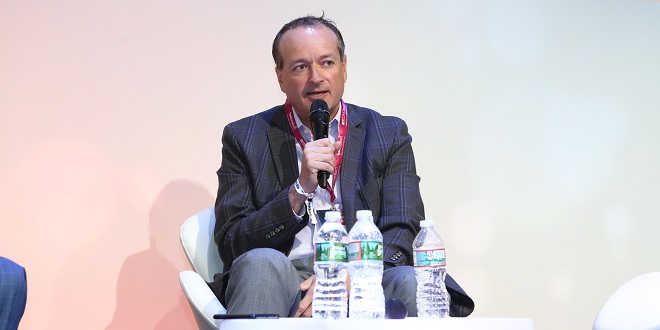Joe Asher, CEO at William Hill US, told SBC Magazine that he is a “big believer” in the power of live streaming. He also explained how US success is key for the popularity of sports outside of the ‘big four’, before confirming that the company’s core Nevada business will continue to fund its investment in other states.
SBC: What is the biggest piece of advice you would give to those eyeing up opportunities in the US sports betting market?
JA: I don’t know if it’s my place to be advising them, but my general statement would be that each territory is very different. There’s different regulatory requirements and there are different consumer preferences. The fundamentals of the business are similar of course, but there are pretty substantial differences from state to state.
SBC: Providing an omnichannel experience is a constant challenge for the biggest betting brands; how has William Hill US been driving customers from retail outlets to online, particularly in Nevada?
JA: We are happy to serve the customer wherever he or she wants to bet, so we try to create really good sports book experiences for those who want the retail experience and then, at the same time, we have a very easy to use mobile app which allows people to get their bet down outside the sportsbook as easily as possible.
They are different experiences. Of course, retail in the US is very different from the UK. It is a much more social experience in the US, probably more transactional in the UK.
SBC: Speaking at BOSA, you said that operators needed ‘stomach for the swings’ when it comes to pricing; what do you see as a healthy margin?
JA: The margin in Nevada has been 5 percent for the last couple of years. We’ve been north of 6 percent in Nevada on average for quite some time. I think that’s a healthy margin, although pretty different to the UK. We have to maintain competitive pricing with the offshore, illegal market.
SBC: Do you think this 5 or 6 percent figure is a fair amount?
JA: It’s certainly where the market is in the US, sure. Obviously, you’re always looking to do what you can to increase your margin a little bit because other than gaming tax the rest of the costs are pretty much fixed and so the incremental margin drops to the bottom line.
But again, you have to maintain competitive pricing with other outlets that customers can choose including the black market. The theoretical margin on straight bets is 4.55 percent – that’s the majority of bets. Then the higher margin on parlays or on futures. A blend in that 5 to 7 range is where the market is.
SBC: At the same event, you said that there is a misconception over the in-play opportunity, with most still fundamentally betting on the outcome of the game; is this something you expect to change?
JA: They mostly bet on the outcome of the game, or a defined subset of the game. Next innings in baseball is a pretty popular one. Tennis on the next game or set. I think that’s what people in the US like to bet, it’s the majority of the in-play betting.
When a popular team is down, people like to bet on them to come back and win. But, as with everything, it continues to evolve. For example, will someone make or miss this shot? That’s quite granular and it’s to be determined how big the market is for this sort of stuff.
SBC: Do you expect player props betting – particularly in-game – to take off in the US? What have you seen at William Hill US so far?
JA: It’s pretty small. In the Super Bowl, there’s obviously a lot of prop betting – that’s the one major exception. But I think people trend towards the more traditional who’s going to win the game, total points scored or is team A going to cover the points spread against team B.
SBC: The top four US sports have inevitably dominated the sports betting handle; which of the more European sports do you think can provide the biggest challenge? Might this be tennis?
JA: I don’t know that I think of it as a European sport, there’s quite a bit of tennis in the US. It’s a big in-play sport but pre-match and overall betting is not anywhere close to football, basketball or baseball – just not anywhere close. And I don’t expect that to change.
SBC: Do you think it would be more popular if there were more top players in the US, particularly on the male side?
JA: It still wouldn’t reach the level of the major team sports in the US, but obviously having a good American player drives interest. You look at the interest in Serena Williams, and even her sister back in her heyday. Serena has always been quite popular from a betting perspective. Sure I wasn’t in the business back in the Jimmy Connors, John McEnroe era but clearly having popular American players drives betting interest.
And that’s a key for other sports as well, for example, women’s soccer is amazingly popular in the US right now because the team is so good. If the men could field a team to compete in the World Cup then it would become a massive event here. I just can’t even imagine what it would be like if the Americans actually had a chance to win, it would be unbelievable.
SBC: We are starting to see data and content providers testing the water with live streaming on mobile apps; have you adopted anything like this yet?
JA: Not yet in the US. I think live streaming for in-play is going to be really big in the US – one of the big opportunities in US sports, not limited to tennis but for all sports. I’m a big believer in streaming where you can watch the video and place the bet right there in the app. There’s no doubt that’s where the future is going to be.
SBC: How far away do you think you are on William Hill US?
JA: Well, I think a lot of it is driven by the sports leagues and their existing contracts for video. I think it will play out as the TV contracts come up for renewal. I would expect all the leagues to be, as they would with any commercial negotiation, looking at the landscape and seeing how this evolves. But clearly it’s going to be a big driver.
SBC: Do you think that the actual live footage is imperative for this to be a success, or might some get around the costs by using data-driven animations?
JA: It’s obviously better if you see the action. The games that people bet on today are those that they can watch on television, right. So, having an animation type feature is better than nothing, but it’s clearly inferior to actually seeing the event.
SBC: You said at BOSA that you thought there’s been too much attention on New Jersey; why do you think that?
JA: I just think that the US is a big country. There’s been a lot of attention around New Jersey. I get it because it was the state behind the litigation which ultimately opened up the market and it’s a decent sized state as well. But the market is far bigger than New Jersey.
Obviously, the Nevada market is a big market too. Pennsylvania has a much bigger population, but you have the issue around the tax rate. Mississippi is a different market too.
There’s a lot going on in the US, and a lot of interest in New Jersey – perhaps deservedly so – but I think there’s been too much focus on one state rather than the broader industry and what’s going on elsewhere.
SBC: What did you make of New Jersey surpassing Nevada for sports betting handle in May; is this a trend that will continue?
JA: Oh yeah, there’s no doubt. You can find quotes from me going back a number of years where I’ve said that the New Jersey market will be twice the size of Nevada. And that’s just based on population, as well as the sports and sports betting culture in the North East.
It has some of the most storied sports franchises in the area in all the sports. The New York Giants, the New York Jets, the Knicks – although they’re not quite so good now. You’ve got the Rangers, Philadelphia Eagles who are an incredibly popular team and big in South Jersey. You’ve got all these franchises.
For three or four years I’ve been saying that the New Jersey market is going to be twice the size of Nevada. And it’s obviously still going, still ramping up, which it should given the population. So I’m not at all surprised, it would be a bigger surprise if it wasn’t the case.
SBC: Finally, what does the rest of the year look like for William Hill US?
JA: There’s a lot going on. We’re looking to get Iowa going, and Indiana. There’s lots of work going in to making sure that we get live in those states.
At the same time, we’re working on a new tech platform that we’re getting ready to launch in the coming weeks, while focusing on our core Nevada business which is very important because it’s funding a lot of the investment in other states for us.
And then we’re also starting to prepare for the Eldorado Caesars merger because under our agreement with Eldorado we run the sportsbooks for properties they acquire which includes Caesars – both retail and mobile. There’s just an amazing amount going on, and I expect it to continue being that way.
______________









